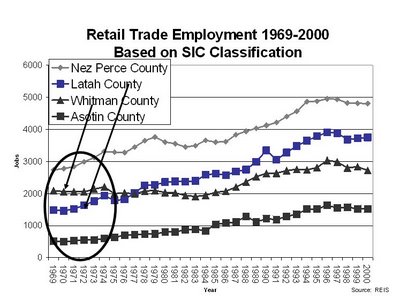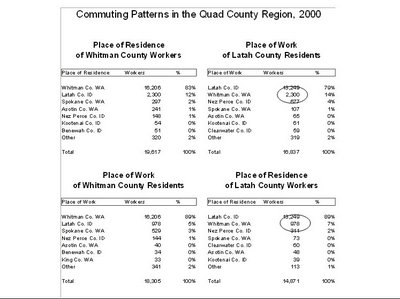This is timely, given my previous posts today on
the latah County "big box" ordinance and
the Whitman County rural zoning ordinance.
Wal-Mart Myth #8 debunked by Steven Peterson, U of I Research Economist, at the
Moscow Chamber of Commerce luncheon on August 23, 2006.
Charge #8: If Moscow keeps out the “big boxes” and restricts retail trade development it will remain the retail trade hub of the region and the home of the Palouse.Fact: Large retailers locate where the political risk and market risk is lowPolitical risk is the risk that if a retail firm heavily invests in the community it will be not be allowed to open its doors.Market risk is the risk that a competitor may produce a better product at a lower price than your firm.Question: Is the political risk of locating a new firm is Moscow rising?Wal-Mart is reported to have spent nearly $500,000 on the Thompson Addition rezone (to date). Their application was rejected by the Moscow City Council.Fact: Moscow’s position is tenuousHistorically Moscow emerged as the Palouse region trade hub in the 1970s. Pullman/Whitman County was the regional trade hub prior to the mid-1970s, with greater retail trade sales, income, and jobs than Moscow/Latah County. An unfavorable business climate in Pullman and Whitman County may have been a primary cause (although the business climate has become more favorable in the last 5 years).There is no guarantee that Moscow will maintain its retail trade sector vitality Fact: Pullman’s underdeveloped retail trade and service sectors harms its economyIf it were not for Schweitzer Engineering both the City of Pullman and Whitman County would likely be facing negative population, jobs, and income losses. …………however, because of the underdeveloped retail trade, service, and housing sector in Pullman, Moscow may be benefiting as much from the growth of Schweitzer Engineering as Pullman.Fact: Moscow may be developing an unfavorable business climateMoscow may be developing the perception of an unfriendly business climate: 1) The enactment of the “big box ordinance” and proposed future size cap for retail firms 2) The rejection of the Thompson 77 acre rezone 3) The “frosty” reception received by the Hawkins retail trade development to west of Moscow 4) The future possible restrictions on single-family residential growth. 4) The proposed “dark box” ordinance.Fact: Shoppers vote with their feetShoppers “follow” the large retailers. Moscow shoppers will follow the large boxes. If the large retailers locate elsewhere or existing retailers leave.. the shoppers will follow them. This is exactly what happened to the shoppers in Whitman County three decades ago. They now shop in Lewiston, Moscow, and Spokane. Pullman’s per capita retail sales are $5,996 versus $13,060 for Moscow.Fact: Homeowners vote with their feetSubdivision and related zoning laws in Pullman and Whitman County enacted in the 1970s and 1980s were designed to force homeowners into high density residential areas in Pullman. Instead Pullman workers moved to Moscow and Lewiston.
Fact: Pullman’s underdeveloped retail trade and service sectors harms its economyIf it were not for Schweitzer Engineering both the City of Pullman and Whitman County would likely be facing negative population, jobs, and income losses. …………however, because of the underdeveloped retail trade, service, and housing sector in Pullman, Moscow may be benefiting as much from the growth of Schweitzer Engineering as Pullman.Fact: Moscow may be developing an unfavorable business climateMoscow may be developing the perception of an unfriendly business climate: 1) The enactment of the “big box ordinance” and proposed future size cap for retail firms 2) The rejection of the Thompson 77 acre rezone 3) The “frosty” reception received by the Hawkins retail trade development to west of Moscow 4) The future possible restrictions on single-family residential growth. 4) The proposed “dark box” ordinance.Fact: Shoppers vote with their feetShoppers “follow” the large retailers. Moscow shoppers will follow the large boxes. If the large retailers locate elsewhere or existing retailers leave.. the shoppers will follow them. This is exactly what happened to the shoppers in Whitman County three decades ago. They now shop in Lewiston, Moscow, and Spokane. Pullman’s per capita retail sales are $5,996 versus $13,060 for Moscow.Fact: Homeowners vote with their feetSubdivision and related zoning laws in Pullman and Whitman County enacted in the 1970s and 1980s were designed to force homeowners into high density residential areas in Pullman. Instead Pullman workers moved to Moscow and Lewiston.
2,300 Moscow residents work in Pullman versus 978 Pullman residents work in Moscow for a net of 1,322 commuters.

Fact: The exodus of Moscow shoppers to the big boxes outside the region will hurt all retailers in Moscow
The exodus of large retailers from Moscow (or the location elsewhere of potential new retail firms) will result in a gradual reduction in growth of overall retail trade and service customers. This may actually harm main street business by reducing customers for all retail businesses in the community. Depending on the severity, Moscow will see increased empty storefronts and buildings; reduced per capita incomes; reduced retail trade wages; and increased local unemployment over time.Fact: Moscow will lose millions of dollars of tax revenues by rejecting large retailersMoscow’s Wal-Mart contributed approximately $500,000 per year in local taxes, which included $101,000 in 2005 in local property taxes, $24,000 in personal property taxes, for a total of $125,000. In addition Wal-Mart contributes about $2.5 million in sales taxes of which approximately 15% or $375,000 is returned to local governments.A shopping center produces millions of property tax and sales tax dollarsWarning: Retail trade bleeds to death slowlyDecisions made by Moscow today will not be fully felt for 10-15 years.It took 2-3 decades for Pullman’s retail trade and service sectors to declineThe City of Moscow, Latah County (and possibly the State of Idaho) will likely lose millions im property, sales, and income taxes, as aresult of retail trade development locating out of the city limits from the rejection of the Thompson 77 acre rezone (and other future commercial development restrictions).
If Pullman opens a Wal-Mart super center with the lowest priced groceries in the Palouse that are sales tax free, the Moscow wal-Mart without groceries could ultimately close over time. This would accelerate the erosion of the retail trade base in Moscow.Quote of Note 6:"My plans should not be taken as an indication it is easy to do business here, because it is not."- Ed Schweitzer, Pullman
Heather Frye, "Schweitzer will expand Pullman site but owner warns county must become more business-friendly," Lewiston Tribune, Lewiston, Idaho, Page: 1A, 3/28/02.Technorati Tags:
wal-mart walmart


No comments:
Post a Comment